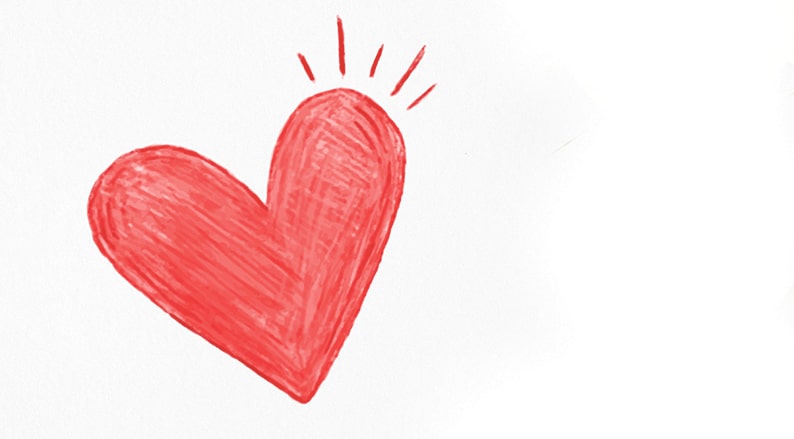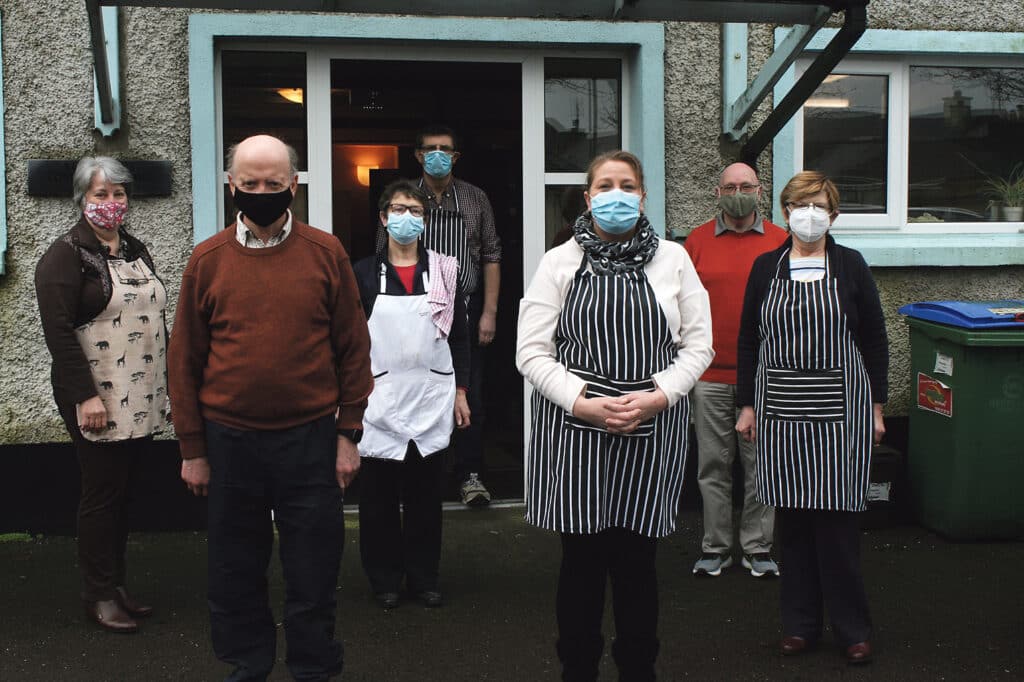It’s been a tough ten months; January felt like it would never end and the finish line seems to be moving all the time. Our lives have literally been turned upside down: Children are out of school, parents out of work and rising Covid numbers have confined us back to our homes. Dealing with fear, uncertainty, loss, and lack of space on a daily basis means that Covid is impacting all of our relationships in one way or another. Whether you’re single or part of a couple or family, this pandemic has posed all sorts of challenges – from giving each other space to socially distant dating – and left us all wondering just what will emerge from our so-called ‘bubbles’ when Covid is behind us?
Dr Ray O’Neill is an assistant professor in Psychotherapy at DCU. He also works in private practice in Dublin and Beara. Dr O’Neill tells Mary O’Brien he believes that because the pressure has been building for so long with so few options available to us for any kind of release, we’ve hit that psychological block around the 20th mile that is so familiar to marathon runners.

“We have to remember that there is a finishing line,” Dr O’Neill says. “There is an end on the horizon and we are going to get through this; we just have to believe it will happen and run that little bit longer, or walk, or even stumble, but we have to keep believing and moving towards it.
“January is dark and depressing on a good year but on a Covid year it’s very hard and we all feel very stuck without those usual releases like being able to go for a coffee or a meal, meet up with friends, or get away for a weekend.”
If this frustration or anxiety is affecting your relationships, Dr O’Neill’s advice is to name what’s wrong. “Sometimes just saying ‘Look I’m having a bad day’ or ‘I’m a bit annoyed with you or with myself’ or ‘We’re not getting on, am I the only one who’s upset, or angry or exhausted?’ can help. When we name our emotions or frustrations in a non-confrontational way, they shift place. It is in the silence that we believe the worst of ourselves and others. While the issues are still there, the result is that we feel less lonely, less isolated.
“’How are you?’ is such a simple but powerful thing to ask someone if you really mean it,” he continues. Just looking directly at someone, perhaps holding onto their shoulder and saying those words can help.
“It’s these trials in life that can either strengthen or break someone; if they break you, then to move on from that you get help, crutches, a plaster cast, you don’t let yourself stay broken as a person.”
For better or worse, some couples have already separated during this pandemic. “This kind of crisis can bring out the worst in people but it can also bring out the best,” says O’Neill, who reveals that many couples are actually separating with less conflict within the current climate. “As a result of having to continue to live together or having to respect the ‘bubble’, many couples are handling separation in a healthier or more civilised manner that they might have pre-Covid,” he explains.
Since last March our homes have becomes schools, gyms, pubs and working places. These high energy levels can cause exhaustion and, at times, leaves us with very little room to breathe. Dr O’Neill emphasises the importance of couples spending quality time together, and ideally outside of our office/school homes.
“Create space and time away from distractions – phones, TV etc. Don’t bring screens and devices into the bedroom or to the dining table. It’s small stuff but it will make the other person feel appreciated and minded. Sit or lie down together or go for a walk together. Sitting in front of a screen together is lovely but it doesn’t really count, it is the viewing that is shared, not the relationship.”
Communication is also key to a successful relationship. “Everyone has their own experience and their own side of the story and if you want a genuine chance for yours to be heard, then we start in listening to the other persons,” he says.
“The couples who tend to be more resilient and adaptive will ask ‘how do we make the most out of this tough situation?’”
A red flag in a relationship for O’Neill is when a couple has different attitudes towards something seriously critical within the pandemic, such as vaccination or wearing a mask.
“For me it’s non-negotiable,” says O’Neill. “We need to think of other people beyond ourselves and there are consequences if we don’t. I don’t mean the relationship is necessarily over in this scenario, but to question what is going on in such a decision. There is a lot of fear around Covid and that fear finds its place in anger or resistance and defiance. When we recognise that this is about fear, then we can begin to talk it through.”
An interesting outcome of the pandemic according to O’Neill is that it has revealed that some people who have suffered and taken responsibility for their mental health issues or managing their anxieties have evidenced themselves as oftentimes being better equipped at navigating a Covid world compared to those people who haven’t experienced any kind of debilitating depression or difficulties in life before.
“I think the Irish people learnt a lot from the last recession, which is the last time we had to deal with real difficulty,” he says. “We learnt that it’s good, it’s better, to talk. And perhaps this time around because we didn’t have the usual Irish crutch of the pub and alcohol and we had to do things differently, for example over zoom, supports that wouldn’t have been accessible before suddenly became available to us. There was a huge outreach for psychotherapy and counselling services in the first lockdown.”
If you are suffering from anxiety, Dr O’Neill recommends minimising your news intake. “Misery likes company and unfortunately, as a result of this, misery sells,” he says. “We need good news too. I tend to buy a newspaper or watch the news on the TV; I stay away from the Internet, as I just end up getting upset by the online comments. We’re more than that and we’re better than that, which is what we need to remind ourselves of, particularly when we feel bombarded. We live in such a demand culture that we lose sight of the important stuff. Yes there are vaccine delays but we are still in a very privileged position a) because there is a vaccine available and b) because it will happen sooner for you and I than it will for 85 per cent of the world’s population.”
The antidote to misery? “We need to have fun together. The best anti-anxiety medicine is happiness, joy or entertainment.
“Within families, make sure that everyone gets a chance to propose a group activity, whether it’s a board game or cooking together.
Appreciate the company you have, because single people have had it very tough in this pandemic. “We might drive each other crazy at times in our family units, but that hug is priceless,” says O’Neill.
However it’s not all bad for singles. While dating has become more challenging, O’Neill says that an interesting outcome of the pandemic in online dating has been that most timewasters have gone offline. This is good news for anyone looking for a relationship. “The quick and easy culture has been limited, which means it’s a lot more possible to find someone interested in a serious relationship,” says O’Neill, who believes that alcohol being taken out of the equation also offers more nervous, but genuine, real encounters.
“People are having to be a lot more inventive and all these other possibilities have opened up around dating as a result.”
Courting is happening over zoom chats, whatsapp and similar platforms – “which isn’t a bad thing,” says O’Neill, “as it involves conversation and is a good screening process.
“The long engagement traditionally offered an opportunity to really get to know each other to see if you were suitable for marriage,” says O’Neill. “The opportunity this pandemic has presented us with is the deferred gratification of meeting or going to the cinema together, sharing a meal or sleeping together, which means there is more chance for something authentic to emerge. I really think it’s possible for people to make even more of a connection in this scenario.”
Laughter again is really important here. “It’s the best relaxant,” says O’Neill. “When you’re laughing, you’re being yourself, and when someone responds with a smile or with laughter, you know they’re meeting you. There is nothing, including Covid, that should stop us from laughing, whether it’s over a phone, screen or for the fortunate ones, in person.”
O’Neill admits he is curious about what will happen after this period in our lives. “How we live our lives is going to be very influenced by what we’ve gone through,” he says.
“I think people will be exhausted and bored with the dating apps and turn to things like speed dating instead.
There are opportunities and positive outcomes in every crisis. “There are lots of positives from this pandemic and we may not appreciate them until later,” says O’Neill. “It has made us see that we can do things different, whether that’s Christmas, getting married, or working from home.
“One of the things I’ve liked about the Irish response to this pandemic is that, for better or worse historically speaking with the twitching neighbours’ net curtains and everything else, we are always looking to each other. We have in this pandemic buckled down to our individual detriment because we get that the community is important and what happens our neighbours in the next village and the next county is important. When I see so much of the selfish individualism flooding the US and what that’s done, I feel very glad to be here in Ireland.
“We have been through national traumas, loss and deprivation as a country, for more years than we care to remember, on so many different levels. We’re selfish sure, like all human beings are, but I think we do mind each other, which is something that should be celebrated at the end of this pandemic.”
We also need to acknowledge what we have lost.
“Covid has prevented us from carrying out the rituals around death and dying that Irish people do so well and which show such humanity; the gathering as a community to support those who have lost, the handshake, the hug, the eye contact – that for me is the biggest grief in this pandemic. That goodbye to someone we love is so critical and for that to be taken away is devastating. We need to acknowledge this, as and when we move back towards celebrating together again…



